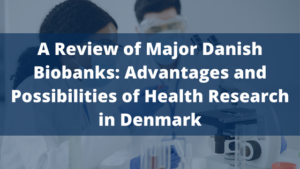Biobank research may lead to an improved understanding of disease etiology and advance personalized medicine. Denmark (population ~5.9 million) provides a unique setting for population-based health research. The country is a rich source of biobanks and the universal, tax-funded healthcare system delivers routinely collected data to numerous registries and databases. By virtue of the civil registration number (assigned uniquely to all Danish citizens), biological specimens stored in biobanks can be combined with clinical and demographic data from these population-based health registries and databases.

In this review, the authors aim to provide an understanding of advantages and possibilities of biobank research in Denmark. As knowledge about the Danish setting is needed to grasp the full potential, we first introduce the Danish healthcare system, the Civil Registration System, the population-based registries, and the interface with biobanks. We then describe the biobank infrastructures, comprising the Danish National Biobank Initiative, the Bio- and Genome Bank Denmark, and the Danish National Genome Center. Further, they briefly provide an overview of fourteen selected biobanks, including: The Danish Newborn Screening Biobank; The Danish National Birth Cohort; The Danish Twin Registry Biobank; Diet, Cancer and Health; Diet, Cancer and Health – Next generations; Danish Centre for Strategic Research in Type 2 Diabetes; Vejle Diabetes Biobank; The Copenhagen Hospital Biobank; The Copenhagen City Heart Study; The Copenhagen General Population Study; The Danish Cancer Biobank; The Danish Rheumatological Biobank; The Danish Blood Donor Study; and The Danish Pathology Databank.
Click to read more.
